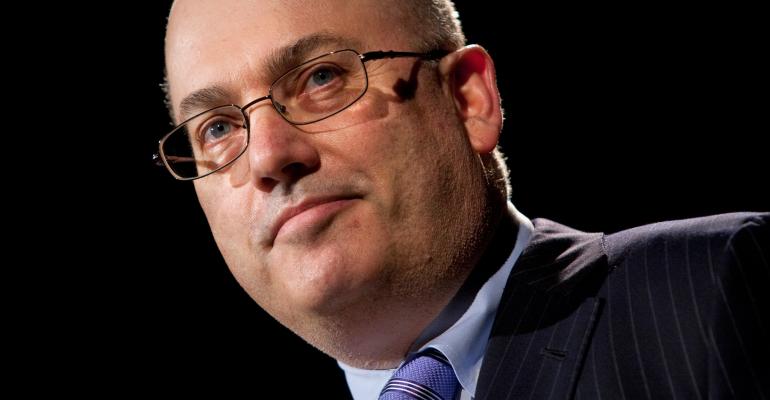(Bloomberg) -- Billionaire Steven Cohen has a way to raise money from outside investors prior to 2018, the year he can resume running hedge funds under a January settlement with the U.S. Securities and Exchange Commission.
Cohen has formed a firm called Stamford Harbor Capital that employs top executives from his family office, and which plans to run private funds that will initially invest in illiquid and nonpublic securities, according to a regulatory filing this month. Cohen, 59, indirectly owns the firm, which will keep as much as 50 percent of client profits, but he won’t have any supervisory role.
“Steve Cohen owns the entity, but consistent with his January agreement with the SEC he will not supervise the activities of anyone working on its behalf,” said Jonathan Gasthalter, a Stamford Harbor spokesman. “No decision has been made on whether Stamford Harbor will seek or accept outside capital.” Gasthalter said the SEC approved the firm’s application to register as a money manager for outside clients on March 14.
Cohen’s former hedge fund firm, SAC Capital Advisors, in 2013 pleaded guilty to securities fraud and agreed to pay a record $1.8 billion fine. While Cohen wasn’t charged with any wrongdoing under his firm’s settlement with federal prosecutors, he agreed to return SAC’s outside capital and convert the hedge fund manager into a family office, renamed Point72 Asset Management.
‘Engineered With Precision’
An accord with the SEC bars Cohen from handling outside money until Jan. 1, 2018, a restriction far less onerous than the lifetime ban the agency originally planned to seek when it alleged in July 2013 that the billionaire failed to supervise two senior employees charged with insider trading. Setting up a new firm under the control of his lieutenants could generate additional revenue for the family office, help attract and retain top traders and give Cohen a head start when the management embargo expires in 2018.
Stephen Crimmins, a former SEC enforcement attorney who is now a partner at the law firm Murphy & McGonigle, said as long as Cohen stays within the limits set out in his agreement, the hedge fund manager won’t run afoul of the agency. In negotiating the settlement, Cohen’s lawyers were able to include a provision that specifically allows the billionaire to set up a money management firm like Stamford Harbor.
Cohen’s settlement “was engineered with precision -- everything was carefully thought through,” said Crimmins, who was not involved in Cohen’s settlement. “To see him getting active again, that is what the deal was” with the agency.
Florence Harmon, an SEC spokeswoman, declined to comment on the startup.
Five Weeks
Point72 can only manage Cohen’s personal fortune, estimated at $11.2 billion by the Bloomberg Billionaires Index, along with money belonging to his relatives and the firm’s employees.
In a civil action initiated in 2013, the SEC alleged that Cohen personally failed to supervise portfolio managers Michael Steinberg and Mathew Martoma. The agency tempered its case against him in the wake of a 2014 federal appeals court ruling that placed a higher burden on the government to uphold insider-trading convictions. Had the SEC barred Cohen from associating with an asset management company, that would have precluded him from owning a stake in Stamford Harbor.
In settling with Cohen in January, the SEC barred him from holding a supervisory role at a money management firm for about two years. Cohen neither admitted nor denied wrongdoing.
On Feb. 17, about five weeks after the SEC agreement was announced, Cohen filed with the Delaware Division of Corporations to incorporate Stamford Harbor, which, like Point72, is based in Stamford, Connecticut.
‘Indirect Ownership’
Cohen owns Stamford Harbor through a separate holding company that was set up in March, according to filings. While he is “associated with Stamford Harbor by way of his indirect ownership,” the documents say, “Mr. Cohen will not act in a supervisory capacity with respect to Stamford Harbor.”
Point72 executives will also run Stamford Harbor, the SEC filing shows. Douglas Haynes will serve as president of both the family office and Stamford Harbor, Michael Zea will act as chief of strategy for the two firms and Tim Shaughnessy is listed as their chief operating officer.
Stamford Harbor currently has no assets under management, according to its SEC registration. Should the firm seek outside capital, Stamford Harbor will raise money from qualified investors in the U.S. and overseas, according to the filing.
Illiquid Securities
The Stamford Harbor funds will initially invest primarily in nonpublic, restricted and illiquid securities, including privately negotiated equity and debt, the documents say. It also has the latitude to bet on interest and currency rates, sovereign credits, commodities and bank loans.
The Stamford Harbor funds will charge a management fee equaling 2 percent of net assets and a performance fee ranging from 10 percent to 50 percent of the net profits “attributable to certain underlying investments” and subject to high-water marks, the documents show.

